“Ab la dolchor del temps novel”
Message from the Director, E. Brilli, PhD
Around the middle of the 13th century, at the court of the Kingdom of Sicily, a primary location for intercultural contact across religions and the Mediterranean populations, the Tacuinum Sanitatis saw the light. This successful handbook of wellbeing was a rather free translation into Latin from the Arabic medical treatise, the Taqwim al-sihha (“Maintenance of Health”) by Ibn Butlan (d. 1068). Composed in Baghdad more than two centuries earlier, it describes the principles of health based on the theory of climates, seasons, and the four elements. One hundred years later in Lombardy, the Tacuinum was granted a third life, becoming a must-have for rich libraries thanks to a series of lavishly illuminated copies destined for a lay audience. Among these manuscripts, the Vienna codex, or the Cerutti codex, provides the opening image for this April issue of Chronica: “Ver,” the spring.
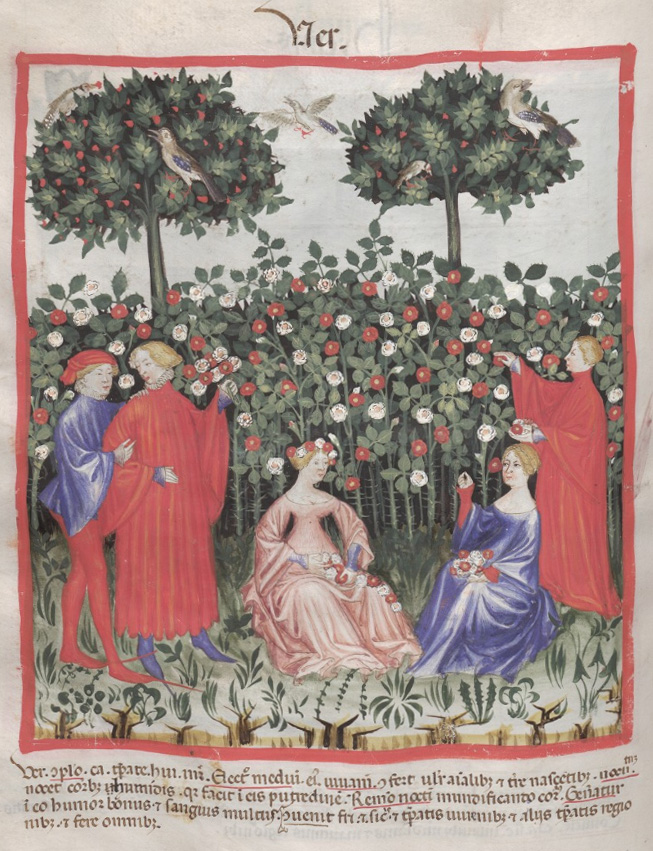
The Latin note succinctly informs us that in this season, nature is “hot, moderately wet in the second degree,” beneficial for all “animals and what comes from the earth,” but also dangerous due to its humidity; hence, the usefulness of “cleaning the bodies” from the spontaneous excess of humors. However, the full-page miniature seems to portray spring in different terms. In a lavish garden resonant with birds, a joyful brigade of three young men picking flowers, and two young women weaving garlands are the protagonists of this courteous scene. The humid spring of Ibn Butlan meets here the Romance literary tradition and its springtime topos that, since William IX and the troubadours, associate the return of the mild season with a resurgence of poetic inspiration, and of course, love.
What does spring bring to CMS this year? As in the Tacuinum and among the troubadours, now that classes are over, April brings the resumption of our dearest love, research. It marks the reappearance of what was submerged and not entirely visible, but with attention and care is ready to flourish in new directions.
Chronica’s News and Stories announce similar trajectories. Two CMS students present the research project “The Other Sister” led by Isabelle Cochelin, which focuses on almost invisible agents of history, women somehow suspended between religious and lay, challenging our ideas of medieval times. This project has just been awarded a Connection Grant from SSHRC for their upcoming international conference in May; congratulations! Soon working with John Magee, Tommaso De Robertis with his Marie Curie post-doctoral research project also explores a silent thread of history, the bridge that connects the late-antique work of John Philoponus and his Commentary on Aristotle’s Physics to 16th-century Western “new science.” Then, if spring brings out silences and desires, CMS could not but dedicate a special Spotlight to the latest book by David Townsend, which summarizes years of research on the question of the expression by preterition of desire in medieval rhetoric, and together the vital dynamic that connects medieval texts and contemporary readers, as well as auxiliary disciplines and hermeneutics.
This spring also brings the end of the first cycle of the CMS Convivium, a pleasant success that we are sure to emulate next year with everyone’s continued contribution. Along with various excellent Publications, Faculty, Student, and Alumni News, it brings us the launch of a new CMS Alumni Programme that we hope will be of great interest to all recent or long-time graduates.
Lastly, it brings us a Farewell, that of Professor Joe Goering, a pillar of CMS for several decades who left an unbridgeable void among his friends and students. May the birds always sing around him on a mild spring day like his teachings and exemplum in our lives.
News & Stories
CMS Students Involved in International Research Group “The Other Sister”
In addition to their PhD candidacy at CMS, Emma Gabe and Laura Moncion are members of “The Other Sister: Non-cloistered Religious Women, 1100-1800,” an international research group along with other University of Toronto members Isabelle Cochelin (History, CMS), Alison More (St. Michael’s College, CMS), Meghan Lescault (History), Joseph Akl (History), Kirsty Schut (PIMS), and international members Angela Carbone (University of Bari Aldo Moro), Sylvie Duval (Université Clermont Auvergne), and Isabel Harvey (Université Catholique de Louvain, UQAM). Emma and Laura discuss their involvement with the project and its contribution to their current research.
Emma Gabe studies lay sisters in late-medieval female monasteries from German-speaking regions. She tells CMS Chronica about provoking the usual boundaries placed on religious women, redefining lay sisters’ place in the historical record, and how this challenging research contributes to “The Other Sister” project.
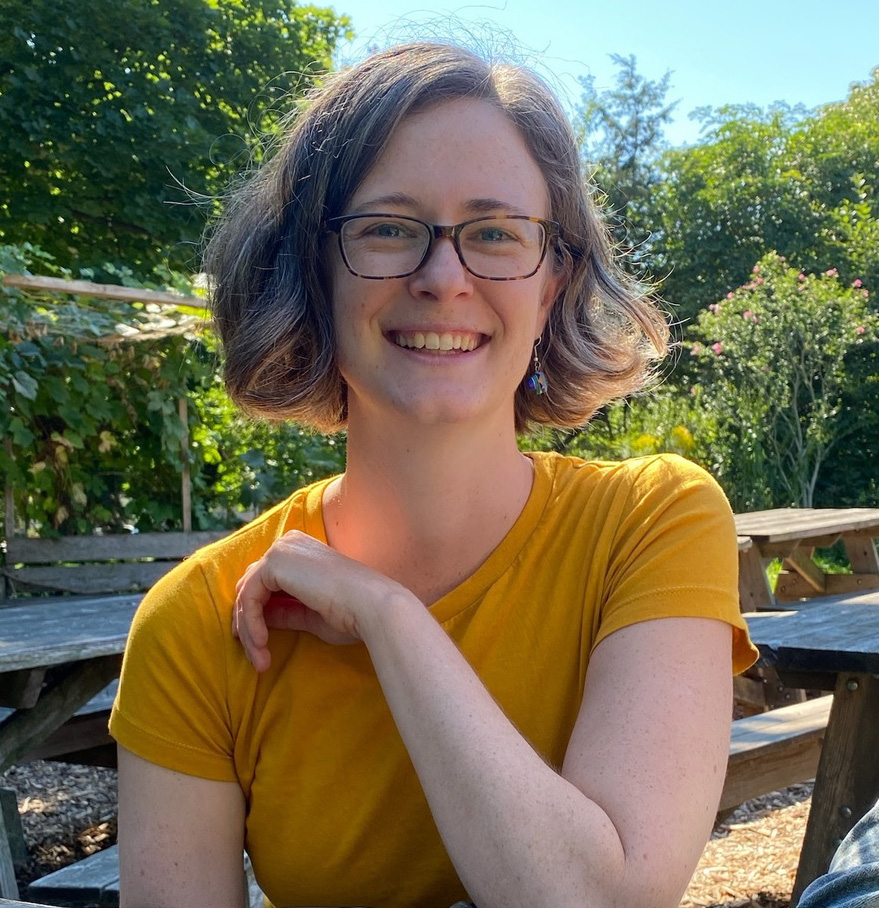
What brought you to CMS and how did your research interests develop here?
I came to CMS to do my MA and stayed! I liked the interdisciplinary nature of CMS, something that drew me to medieval studies in the first place. Although I’m an historian, I appreciate the need to study modern and living languages and medieval literature.
Through Isabelle Cochelin, I became interested in the history of servants and helped with a conference she held on service in premodern Europe. I was a TA for her undergraduate course Servants and Masters (1000–1700), which I went on to teach last year. In taking Isabelle’s course on medieval monasticism, I began researching monastic servants and discovered the lay sisters, who were nuns that performed domestic work in monastic communities. This interest turned into a conference paper, then an article, and, since very little research had been done on these lay sisters, it presented an intriguing opportunity and soon became my dissertation topic.
Please tell us about your research and how it challenges common assumptions in the field.
Through my dissertation, co-supervised by Isabelle and Shami Ghosh, I am currently focusing on lay sisters’ profession rites, and how they were attached to their religious communities. My research shows how lay sisters were integrated into their communities and professed monastic vows like the nuns, but were nonetheless differentiated in other respects. For example, the lay sisters wore different clothing, and their profession rites show that they were not depicted as brides of Christ in the same way as the nuns. My dissertation also examines whether or not lay sisters were to remain enclosed.
Scholars have long neglected lay sisters, perhaps because they do not fit nicely into established categories. Since they tended not to come from the same elite backgrounds as the choir nuns, they also left fewer records, and therefore disparate reference sources. To gather material, I spent three months travelling across Germany in 2021, visiting state archives, city libraries, and even convent archives. In trying to understand the lives of these women, my research mixes the social history of gender and class with religious history.
Not every PhD student has the opportunity to benefit from an international research project like “The Other Sister”; how did you become engaged, and how does it contribute to your research?
Through Isabelle, I became involved with “The Other Sister.” The group’s thematic meetings have led to many fruitful and thought-provoking discussions, particularly probing the boundary between religious and lay. It has been invaluable to meet and talk to other scholars who are grappling with similar questions in relation to different regions, time periods, and amongst different types of religious women.
Religious historiography draws a categorical divide between nuns and lay women. “The Other Sister” shows that these categories are not as fixed as previously assumed. In my case, lay sisters often existed somewhere between the two; they shared some aspects of nuns’ lives in their monastic vows, religious habits, and communal behaviour, and some elements of lay religious lives with their simple vernacular prayers and exemptions to enclosure.
From here, my project could move in many directions. I focus on lay sisters in German-speaking regions, but there is much work to be done exploring lay sisters from different geographical areas and throughout the early modern period. Further, the connections made through “The Other Sister” will be invaluable in shaping this future research.
Laura Moncion’s research on women recluses in late-medieval Alsatian towns challenges presupposed conceptions of gender roles and identities. She shares her explorations and how they intersect with her journey through CMS and with “The Other Sister” project.
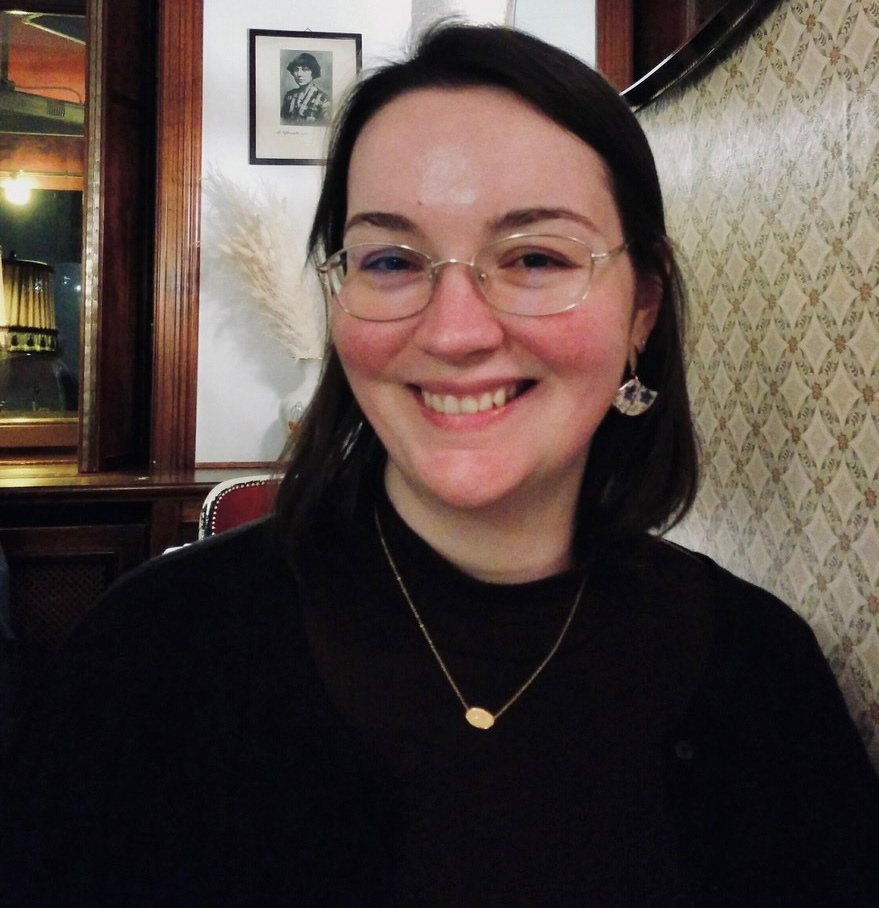
Please tell us about your path to CMS and the evolution of your research interests here.
I came to CMS after completing a BA at McGill University and an MPhil at Memorial University of Newfoundland. I had been interested in medieval studies during both programmes, so I decided to come to Toronto and pursue that interest in a more focused way. I also knew that I would need to learn Latin and had heard that CMS was the place to do it!
My PhD thesis project explores women recluses in late-medieval towns, an unusual topic even for medieval studies. Recluses were people who led religious and spiritual lives confined to their dwellings, ideally until death. They are important because they represent one kind of religious life that exists between monastic and lay, and are especially interesting in this group because of their material limitations. A form of life that barely exists in today’s Christianity, its popularity in the Middle Ages can tell us about attitudes towards religious life, gender, and space.
I became interested in the history of religious reclusion after reading the Revelations of Divine Love, a mystical text written by the recluse Julian of Norwich (d. c. 1416). I was and still am fascinated by this text, particularly its use of language in expressing gender. At the suggestions of my co-supervisors, Isabelle Cochelin and Shami Ghosh, I began to explore what it was like to live as a recluse and how they were perceived by their societies.
Archival materials I have been able to access during research trips to Europe, especially when compared with other more narrative materials referencing saints’ lives, suggest that while the ideal of reclusion was to live alone, recluses were actually likely to live with other people, whether servants, attendants, or other solitaries within the same dwelling. This expands our understanding of life as a medieval recluse, but also challenges the idea of a female gender role that is isolated within a domestic space; rather, the domestic and religious quality of the recluse(s)’s dwelling can be one of community and connection. This private space can function also as a public place (especially when municipal governments were involved in its upkeep), additionally challenging those two categories.
How did this lead to your participation in “The Other Sister,” and what has it meant to you?
I became involved with “The Other Sister” project during its early origin as a small reading group in Isabelle’s office. It has been amazing to see this group - which now includes members from across U of T, notably CMS, the Department of History, and St. Michael’s College, and internationally in Italy, France, and elsewhere - grow in interest, curiosity, and collaboration among scholars discussing non-cloistered religious women. Being involved in an international collaborative project has been a very rewarding experience, and as a student, being part of these discussions has been extremely inspiring.
As part of “The Other Sister,” I have been fortunate to learn about types of religious life I otherwise would have never encountered. I have been able to gain a deeper knowledge about my own thesis topic, organizing a seminar on recluses and exploring ideas in writing blog posts.
How do you anticipate your research expanding?
I’ve become more and more interested in New France, as there are records of at least one woman, Jeanne le Ber, living as a recluse in Ville-Marie (part of Tiohtià:ke or Montréal). “The Other Sister” has given me a place to work out some of this new geographical interest in a preliminary way. I’m also interested in extending the temporal view of reclusion in the Middle Ages. Though much scholarship on recluses is centred in the 13th century, when the vitae of many women recluses were written (e.g. Iuetta of Huy or Christina of Markyate), my research shows that women were embracing this type of life well into the 14th and 15th centuries as well.
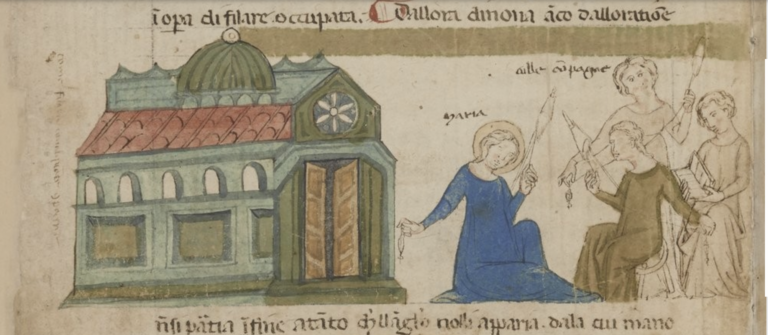
The Toronto section of “The Other Sister” group, through the SSHRC Connection Grant, along with Patricia Stoop (University of Antwerp) and Mary Doyno (University of California State University, Sacramento), is organizing an international conference to be held at U of T (PIMS and St. Michael’s College) and virtually via Zoom, May 18-20, 2023. Registration is free and all are welcome to attend. For more information, please visit the conference’s website.
Learn more about “The Other Sister” project on our blog.
CMS Welcomes Marie Skłodowska-Curie Postdoctoral Fellow Working on John Philoponus and Modern Theories of Space and Void
Tommaso De Robertis begins two years of a three-year Marie Skłodowska-Curie Actions Postdoctoral Fellowship at CMS this fall, returning to the University of Macerata, Italy for the third. Covering the late antique components of the project, the first phase in Toronto will be devoted to the collection and scrutiny of the Greek text of Philoponus’ "Commentary on Aristotle’s Physics", and later two 16th-century Latin translations. The project will also include a virtual video exhibition at the Museo Galileo–Institute for the History of Science in Florence which will be permanently accessible worldwide.
Tommaso and John Magee, his supervisor in Toronto, give us their thoughts on this exciting project, how it will thrive at CMS, and the benefits of an MCSA postdoctoral fellowship.
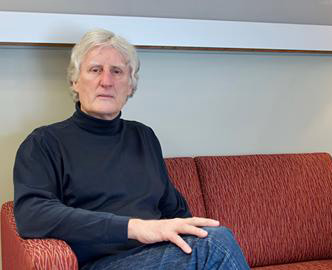
This fall, you will supervise Tommaso De Robertis and his project “Re-orienting the Foundations of New Science: John Philoponus and the Modern Theories of Space and Void (1520-1604)”. How did this collaboration originate and why did Tommaso choose CMS for a research project that also engages with Renaissance culture?
Tommaso, with his supervisors Guido Giglioni and Silvia Fiaschi at Macerata, believed that U of T, with the Centre for Medieval Studies, the Department of Classics, and the Collaborative Specialization in Ancient and Medieval Philosophy (CSAMP), would be the ideal location for his work (and it is). I know my way around Philoponus but nothing of his early-modern interpreters, the focus of this project. With this necessary caveat about my own inadequacies vis-à-vis the subject matter, I conducted some preliminary research, reviewed his published work, met with him at length, and signed on to the project.
The award in itself is prestigious; Tommaso rightly understood the benefits it would confer if granted, and the proposal struck me as highly creative and original. Though the ideas are all his and will continue to be, my role has been to suggest further developments and avenues of inquiry. I was intrigued by his ideas and background and wanted to help those advance as he hoped.
Tommaso will bring something beyond the scope of what we routinely cover in the CSAMP context in particular. With his exemplary training and track record it will be a privilege to assist, but I believe his best resources will be our scholars, graduate students, and libraries. Though it’s pretty clear he’ll be seeking out, perhaps primarily through CSAMP, our expertise here in ancient philosophy, given his training and degrees in Italian literature of the Renaissance and, secondarily, later Middle Ages, CMS seems like the best fit.
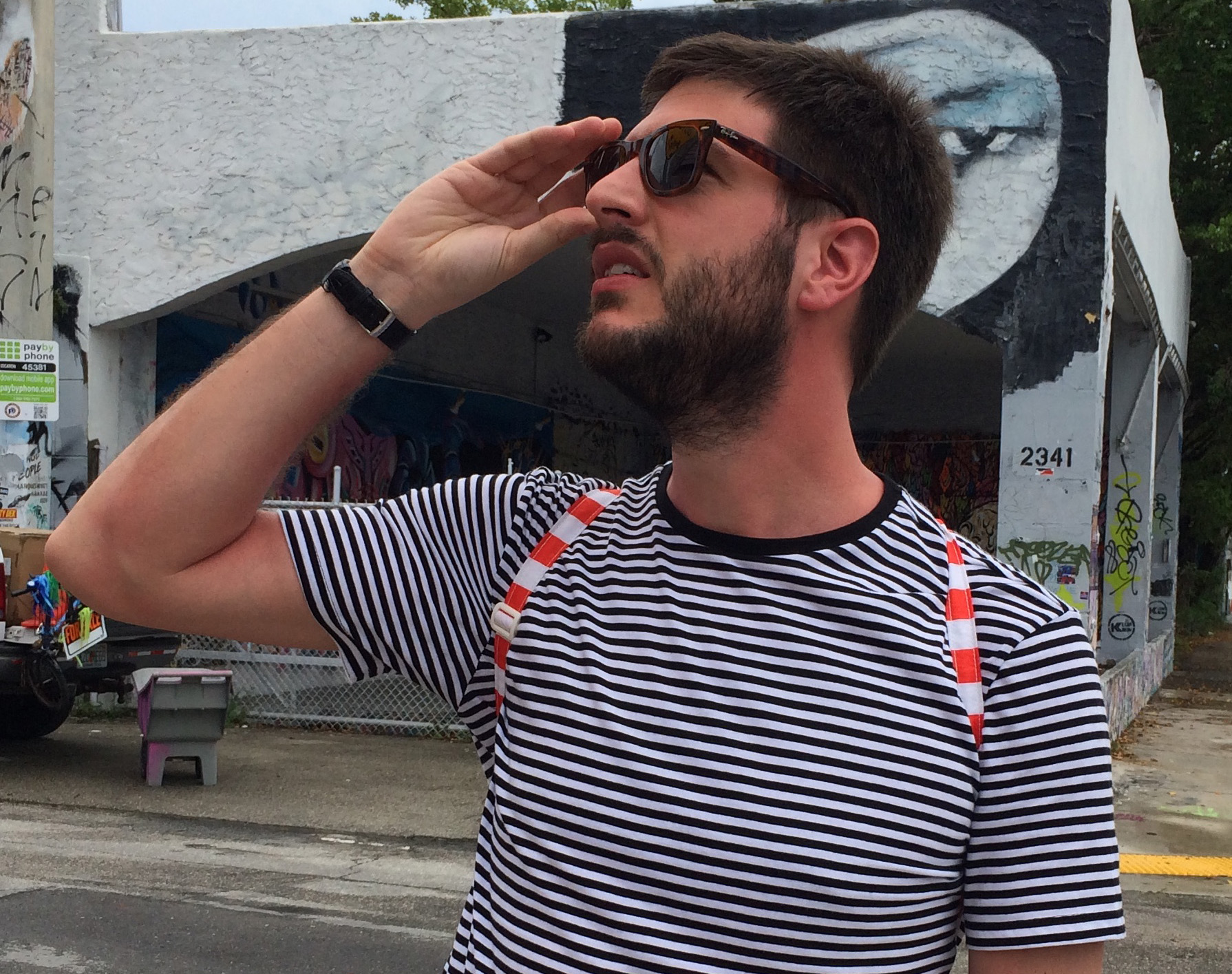
How do you define “JOPHIL,” your current post-doctoral project?
With a background in Philosophy and a special focus on the late medieval and early modern period, I’ve always been extremely fascinated exploring the way in which philosophical and scientific ideas elaborated in ancient times, shaping the intellectual landscape of the European Middle Ages and Renaissance. While at the University of Pennsylvania, I was able to deepen my interests in ancient and late antique Greek philosophy as well as in the formative and classical phases of Islamic thought. Western medieval and Renaissance scholars put the greatest effort into the recovery of this huge literary heritage. In 15th- and 16th-century Italy in particular, an unprecedented translation wave took place which led to the rediscovery of a wealth of previously unknown sources from the Hellenistic and the Islamic medieval era. Especially consequential for early modern philosophy and science in Europe, this provided scholars with access to the works of several Greek interpreters of Aristotle who were either scarcely known or completely unknown in the Middle Ages. John Philoponus was one of them.
Who was John Philoponus, and why does he interest you?
Active in Alexandria during the 6th century CE, Philoponus was a thinker, remarkable for the originality of his ideas. In his Commentary on Aristotle’s Physics, Philoponus argued against Aristotle in favour of the tridimensionality of space and the existence of void space in nature. Both concepts would become central in the emerging New Science of the 17th century, and the discovery that space has three dimensions paved the way for the development of solid geometry, the basis of many applied sciences. Conversely, the notion of void space (the existence of which Aristotle resolutely denied) encouraged new experiments leading to the discovery of atmospheric pressure in the 17th century, the idea that air has weight and density and that, contrary to what Aristotle had argued, men can exploit these features in a number of ways. Given the enormous novelty of Philoponus’ views, the rediscovery of his Physics was like an earthquake for Renaissance science to 16th-century natural philosophers; it provided a ready-made storehouse of weapons with which to question the foundations of Aristotelian physics.
How will your research contribute to the understanding of this figure and his thought?
Philoponus’ role in overturning central tenets of Aristotle’s natural philosophy did not pass unnoticed among scholars of late antique philosophy. However, studies in this field tended to focus exclusively on Philoponus’ own context, and almost completely neglect the later fortune of his corpus. While a number of authoritative contributions have been produced on the impact of Philoponus’ ideas on modern European scientists, these studies have traditionally centred solely on Galileo, unanimously recognized as the “father” of New Science. “JOPHIL” aims to provide a novel picture of the formative period of scientific development that set the ground for Galileo’s epoch-making studies on void and space. This formative period occurred in the 16th century, and its protagonists were the Renaissance natural philosophers who read and interpreted Philoponus’ Physics for the first time. Hence, I propose a shift of focus from the so-called “great minds” to a group of lesser-known scientists and natural philosophers who, through the reading of Philoponus, contributed to re-orienting the development of modern science in the 17th century. This will include Camil-la Erculiani, a theorist with the only published work by a woman on natural philosophy from the 16th century.
What brought you to the interdisciplinary research unit of CMS and how is this feature important to “JOPHIL”?
When it came to selecting the partner institution for this project, the choice of the University of Toronto, CMS in particular, was natural. Not only is the University the most important centre in the world for the study of late antiquity, but thanks to its interdisciplinary nature, CMS is house to the widest community of scholars studying the philosophy of the late antique world. Professor John Magee will serve as principal supervisor for the “JOPHIL” project, but I will receive assistance from many other scholars connected to the Centre: George Boys-Stones, Lloyd Gerson, and CMS Director Elisa Brilli, to mention a few.
“JOPHIL” stands at the crossroads of the Histories of Philosophy and Science, and Classical Reception. It deals with two chronological territories (respectively, late antiquity and early modernity) which are rarely put into dialogue with each other and require therefore expertise from two different institutions. The project adopts conceptual frameworks derived from Mediterranean Studies and Global History in order to set the rise of modern European science in the broader context of the Euro-Mediterranean region. It also borrows instruments from other disciplines such as Textual Criticism, History of the Book, and History of Reading, as it aims to assess how 16th-century European scholars rediscovered, translated, and disseminated Philoponus’ works for the first time. Finally, “JOPHIL” contributes to a recent trend in scholarship that increasingly values a multilingual approach; the project takes into account works written in Latin as well as in the European Vernaculars, without assigning to the former a higher intellectual status. This approach is by default interdisciplinary, since texts belonging to different linguistic traditions usually fall within the expertise of scholars coming from different disciplines.
Please tell us about the original aims of your research and how it challenges current narratives.
Challenging the dominant Eurocentric narratives about the origins of the Scientific Revolution, “JOPHIL” will map, for the first time, the rediscovery and progressive assimilation of Philoponus’ innovative ideas of space and void into 16th-century Europe. It will do so by examining the material recovery of Philoponus’ texts in Renaissance Italy, and by exploring their impact on a number of European thinkers who, between 1520 and 1604, read and discussed Philoponus’ works. The project aims to contribute to re-orient the origins of modern science in two different ways. First, it re-evaluates the role played by non-European thinkers in the shaping of European science, thus fostering a new idea of Europe as the historical product of a variety of different cultures and traditions. Second, it broadens the canon of the protagonists of modern science, thus contributing to more inclusive research and educational practices in the future.
Marie Skłodowska-Curie Actions Postdoctoral Fellowships support researchers’ careers and foster excellence in research. The Postdoctoral Fellowships action targets researchers holding a PhD who wish to carry out their research activities abroad, acquire new skills, and develop their careers. These awards help researchers gain experience in other countries, disciplines, and non-academic sectors. Funding the mobility of researchers outside Europe, the Global Fellowship lasts between 2 and 3 years, the first 1 to 2 years of which are spent in a non-associated third country, followed by a mandatory return phase of 1 year to an organisation based in an EU member state or Horizon Europe associated country. Only nationals or long-term residents of the EU member states or Horizon Europe-associated countries may apply.
The next call for applications opens April 12, 2023, closing September 13, 2023. If you are a prospective applicant or supervisor, please contact CMS Director, Professor E. Brilli as soon as possible to declare your interest.
Read more on the Marie Skłodowska-Curie Actions website.
Spotlight: CMS Professor Emeritus Townsend’s Latest Publication
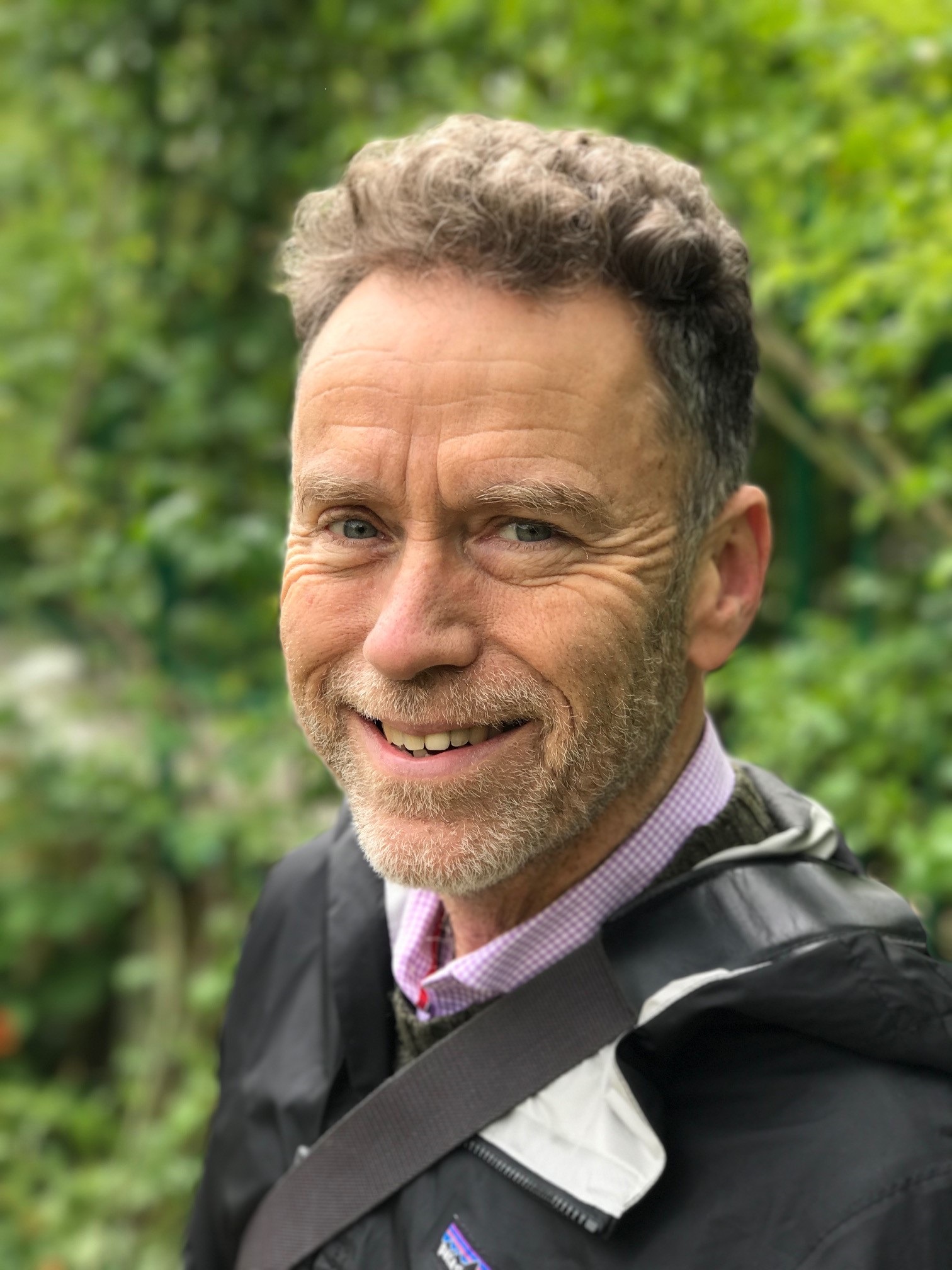
Proof that a haphazard start can nevertheless lead to a successful career, David Townsend explores his academic and professional journey and answers questions about his latest book and research.
My life at CMS unfolded in installments; in other words, I had a chequered history. I completed my MA at the Centre in 1978 and went straight into the doctoral programme the following year, but came down with a weird lung infection that knocked me flat at the start of that fall term. So, I took a leave and went back to Indiana, from whence I came.
I picked up last-minute adjunct work for a term at my undergraduate university - a hellish experience - two sections of freshman comp (on two weeks’ notice) and a section of Intro to Bible (on three days’ notice), all for the princely sum of $4000. The year after, I briefly explored the possibility of becoming a Benedictine monk at a very small Lutheran house in Michigan. As briefly as from the beginning of Advent through Easter, after which I ran screaming from the chapel.
I’m thankful I had those two years off between degrees, as when I re-entered the doctoral programme in 1980, it was with a confirmed sense that this was my desire. I intended to specialize in Old English, then decided Middle English was more marketable. When I was casting about for a topic and a supervisor however, I soon realized I was having more fun talking with George Rigg about Medieval Latin. I learned more from him in one hour than in any exchange I had with faculty, so I decided to jump tracks into one of the least marketable subdisciplines imaginable. Despite that, in 1985 I was incredibly lucky to land a tenure-track job in San Diego, later learning I wasn’t the committee’s first choice, but so what? I was even luckier when a position opened in Medieval Latin and English at CMS two years later.
I loved teaching Latin at the Centre. I loved helping students working on such an extraordinary range of topics acquire that necessary research skill. I loved watching their progress and was so often impressed by the dedication students brought to the considerable task of mastering the language. The wonderful thing about an interdisciplinary centre is that people are less defensive about what they don’t know and more willing to show a lively curiosity about what others do know, to ask for help with things that aren’t squarely in their own field of expertise. That was often in evidence in the Latin reading courses, and more generally within CMS culture among both students and faculty.
CMS training was even more rooted in the classic ancillary research skills in those days, and there was a real aversion among many of my former professors and new senior colleagues to contemporary theory. I soon realized that I needed new hermeneutic equipment, and I started reading at a time when Derridean deconstruction was still very much the rage, along with the New Historicism, Lacanian feminism, reader-response theory, and cultural materialism. Queer theory was just then beginning to be articulated and named as a discipline. I was interested in reading against the grain and the dominant interpretations of the text, and to do so needed new tools in my kit. Those foundational skills that Toronto taught, and still teaches, never ceased to serve me well. I recall hearing some pretty dodgy theory-speak at conferences and thought, ‘semiotic slippage is what happens after you’ve got the grammar right.’ All that went into the interpretive stance that I eventually brought to the writing of this last book.
Your book is about the purposeful omission, and therefore suppression of sexual desire and sexuality in medieval Latin texts; how do you confront and reinterpret these silences?
Preterition starts out as a strategy for suppression, but what I argue in the book is that in many medieval Latin texts that strategy backfires pretty extensively. Pointing to something by claiming you’re not going to talk about it (which is the classic definition of preterition) hands a lot of agency over to your reader, whose take on what you’re not saying (or claiming you’re not saying) may be susceptible of far less negative responses than one first assumes. It’s in the interplay between text and reader that the meaning of the text gets fulfilled, and that can never be tightly controlled. I think it’s incredibly important to explore that if we want to understand the full range of how a given text functioned in its original milieu, and later in its reception history.
What is your next step in this adventure?
A very eminent fellow emeritus suggested recently that I take up the question of Alan of Lille’s diatribe against homosexual relations in De planctu Naturae. So much has been made of that topic already, and I have to give it some long thought before I dive into the wreck. If I take up another substantial academic project, I find myself wanting to go back to literary translation, which I really enjoy - turning Walter of Châtillon’s Alexandreis into English blank verse was a great pleasure. There’s a large body of homoerotic Latin verse from the 11th and 12th centuries that would benefit from collection in a readable verse translation.
Meanwhile, I’ve had a novel about Julian of Norwich meeting Margery Kempe in 1413 sitting on my hard drive for over fifteen years, and I think I see a way of rewriting it that I’d like to consider further. That’s the kind of project you get to play with when you no longer have to file annual activity reports.
Is there anything you would like to add?
I’d like a margarita on the rocks with salt, please.
David Townsend is Professor Emeritus of Medieval Studies and English at the University of Toronto. He is the co-editor of the Oxford Handbook of Medieval Latin Literature (2011) and The Tongue of the Fathers: Gender and Ideology in Twelfth-Century Latin (1998). He has also translated the Alexandreis of Walter of Châtillon (second edition 2007). From 2000–2002 he was the founding director of the undergraduate programme in Sexual Diversity Studies at University College at the University of Toronto.
David’s latest book, Queering Medieval Latin Rhetoric: Silence, Subversion, and Sexual Heterodoxy, from Cultures of Latin, edited by Catherine Conybeare is available through Cambridge University Press. Read more from David in his blog post: When Medieval Silences Speak.
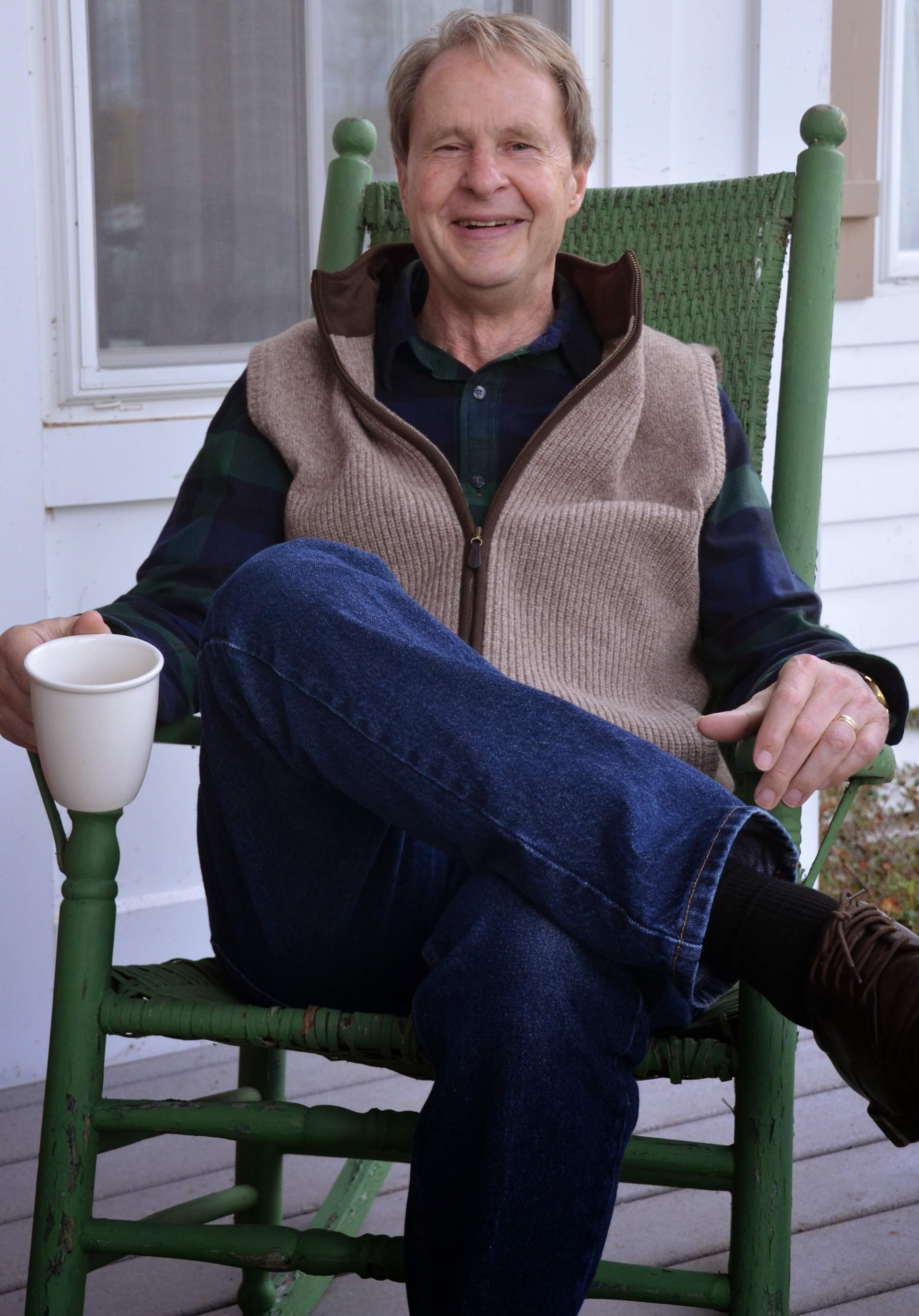
In Memoriam: Joseph W. Goering
It was with great sadness that we announced the passing of Joseph W. Goering this past February, a valued member of our medieval community.
A world-renowned historian of medieval Europe and intellectual history, Professor Goering obtained his PhD at the University of Toronto in 1977 with a dissertation on “The Popularization of Scholastic Ideas in Thirteenth-Century England, and an Anonymous Speculum iuniorum,” supervised by Leonard E. Boyle. Professor Goering was also an incredible instructor, the winner of the Medieval Academy of America’s 2015 CARA Award for Excellence in Teaching, recognizing outstanding pedagogical achievement. He was among the best representatives of the so-called “Toronto school,” with his distinctive mix of first-hand approaches to medieval sources and interdisciplinarity. Most notably, since 1988 and until his retirement, Professor Goering continued to educate generations of CMS students and alumni.
He left his students enriched with his insights and convictions, charmed by his humility and humour, and touched by his patience, warmth, and kindness. A positive, generous, and encouraging presence, he is recognized for his dedication and friendship.
Only a few years ago, this cohort dedicated to him the volume: From Learning to Love: Schools, Law, and Pastoral Care in the Middle Ages. Essays in Honour of Joseph W. Goering, edited by Tristan Sharp in collaboration with Isabelle Cochelin, Greti Dinkova-Bruun, Abigail Firey, and Giulio Silano (PIMS, 2017). No title could have been more appropriate for Professor Goering’s passion for the subject.
His family has created a memorial blog to honour his memory, where you can find a touching tribute by Isabelle Cochelin.
Publications
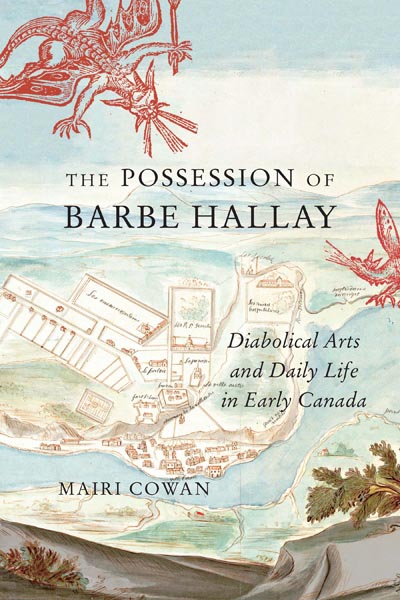
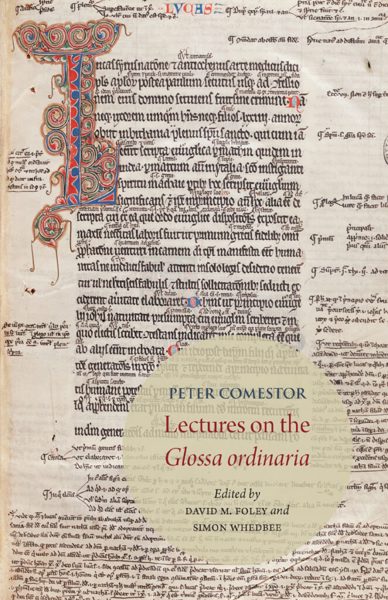
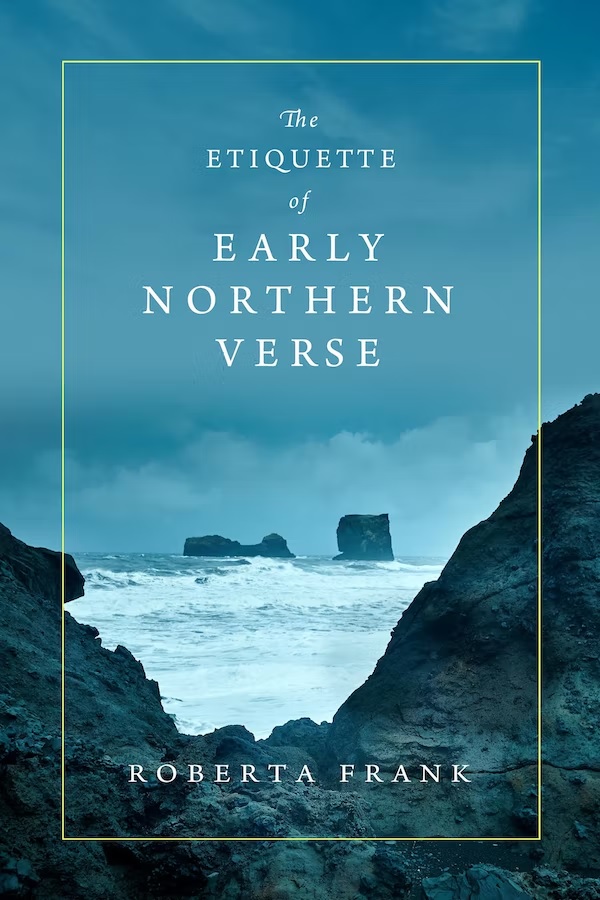
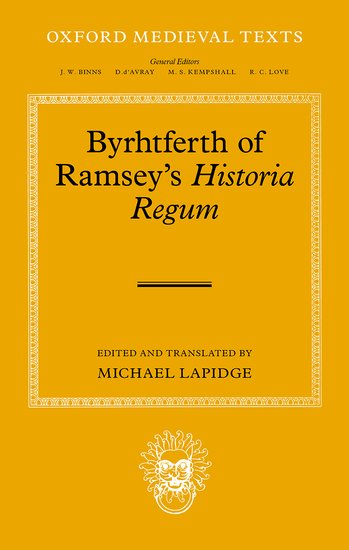
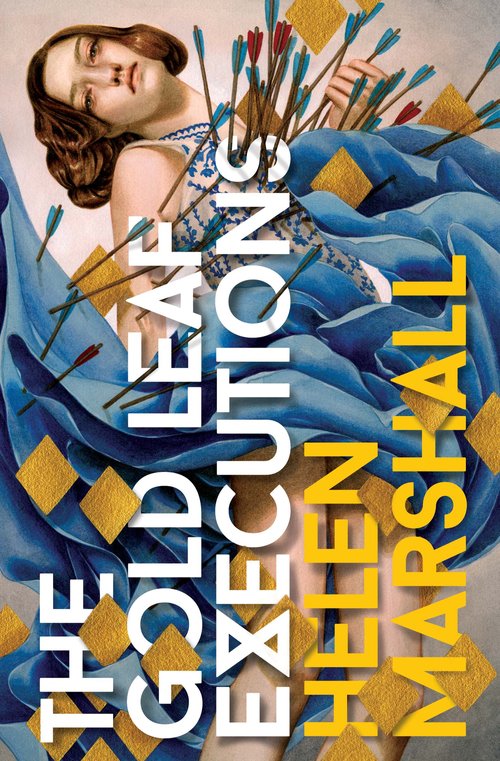
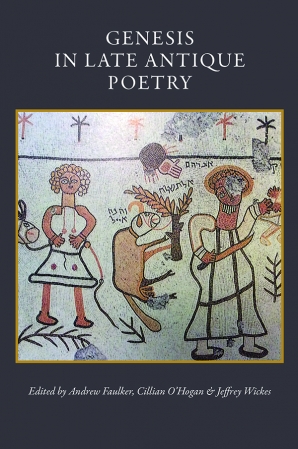
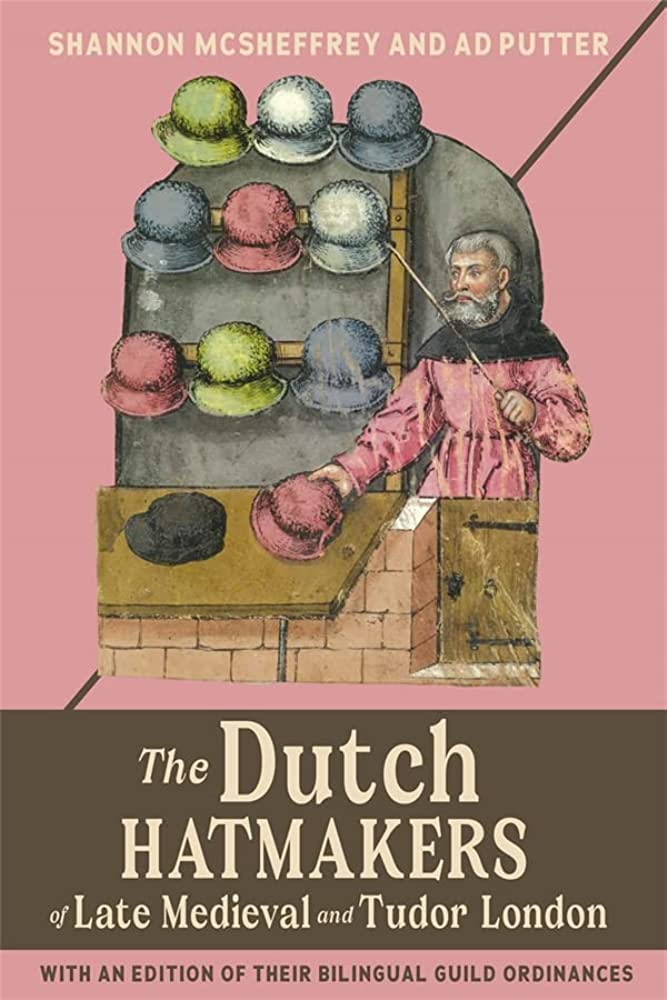
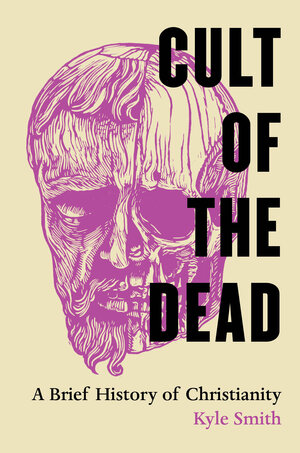
A Brief History of Christianity
University of California Press
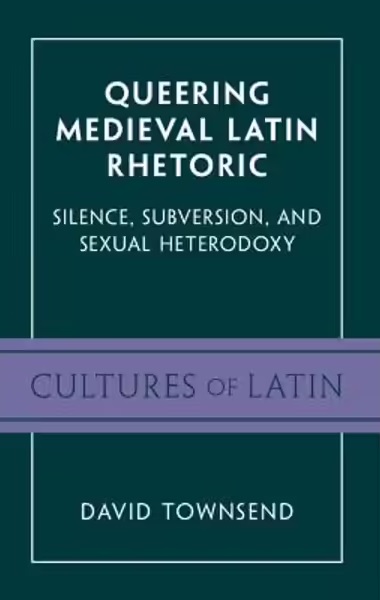
The Publications of the Dictionary of Old English (DOE) book series, PIMS, (series editors Robert Getz and Stephen Pelle) presents two new volumes:
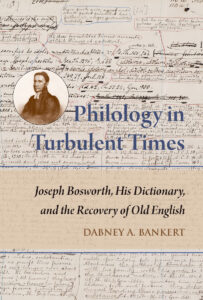
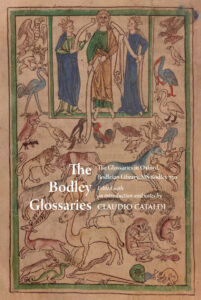
Congratulations also to CMS Faculty recently published in Vol 98, No 2, April 2023 Speculum.
“The Place of Poetry in Sacrobosco’s Sphere: Astronomy and Interpretation” Kara Gaston
“Authorized Realities: The Gesta Romanorum and Thomas Hoccleve’s Poetics of Autobiography” Sebastian Sobecki
CMS Convivium
The Conferences, Lectures, and Visitors Committee introduced the CMS Convivium lecture series this January, which has continued to foster scholarly exchanges and the intellectual community within the Centre and associated bodies. Offering a space to learn about in-progress research and works, showcase faculty, alumni, and community accomplishments, provide an arena for advanced PhD students to present their research topics, and host joint events and lectures by visiting scholars, the Convivium resumes this April with two exciting annual lectures.
Upcoming
April 14
9th Annual Alumni Lecture with Gur Zak, Associate Professor, Comparative Literature and Romance Studies and Head of the Institute of Literatures at the Hebrew University of Jerusalem
“Humanist Compassions: A Literary History of An Emotion”
Moderated by Brian Stock
4:00 - 6:00 pm, Great Hall
April 21
Latin Town Hall, open to CMS students and faculty
2:00 pm, LI301
and
In collaboration with the Journal of Medieval Latin: Annual O'Donnell Lecture with Scott Bruce, Fordham University
“Origen Issues: The Reception of a Renegade Greek Theologian in Early Medieval Europe”
Moderated by Greti Dinkova-Bruun
4:00 - 6:00 pm, Great Hall; reception to follow
Past Events
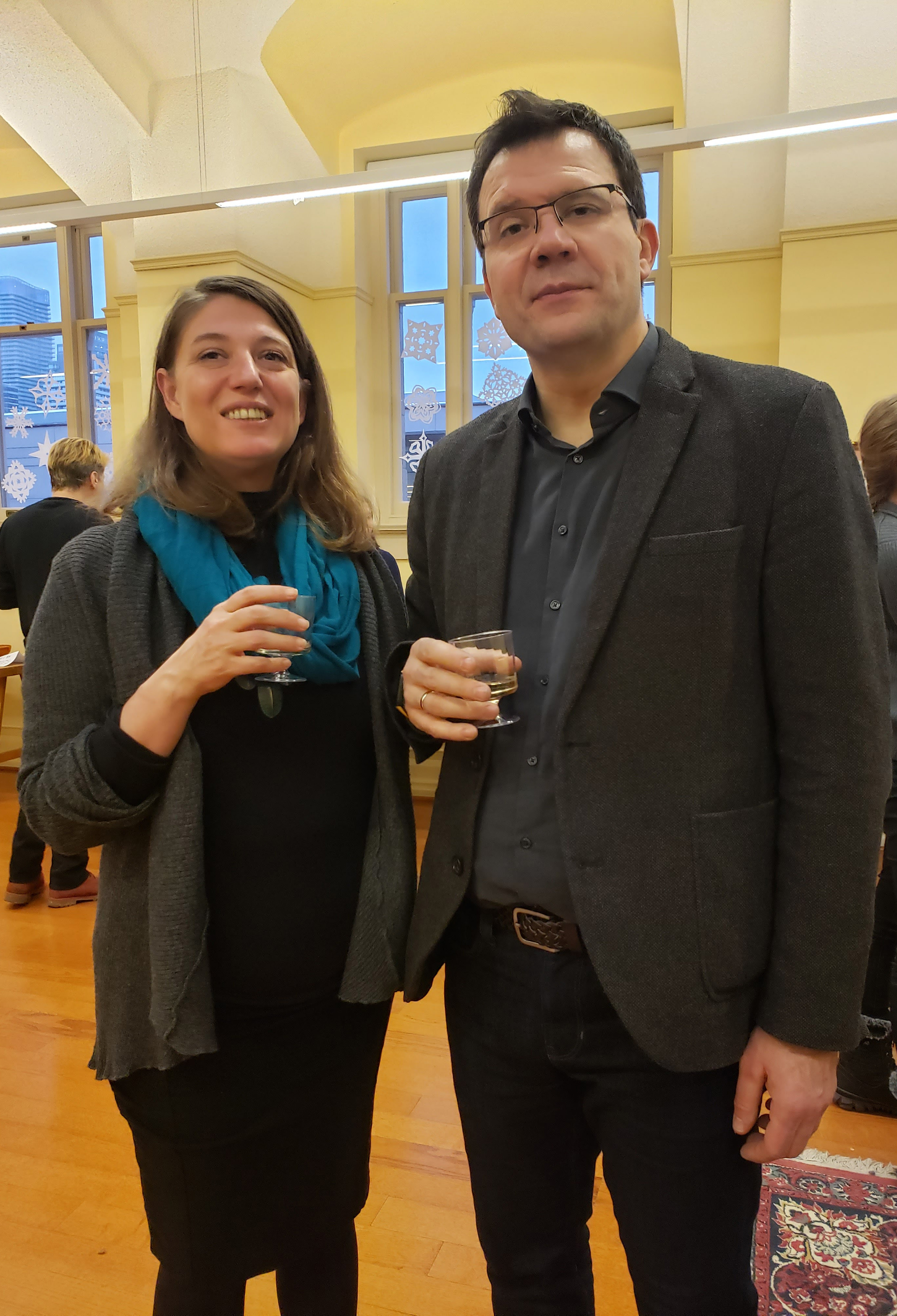
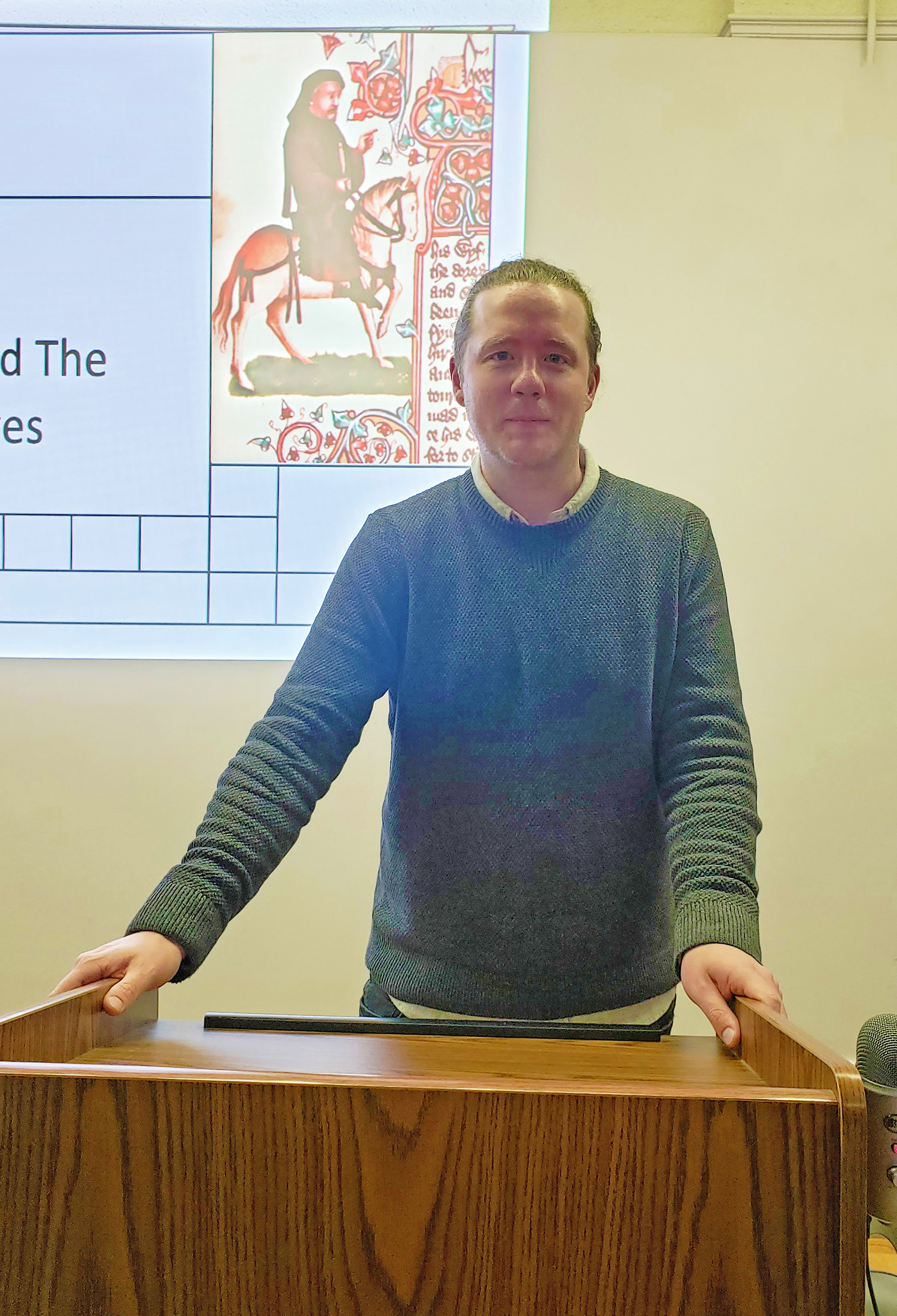
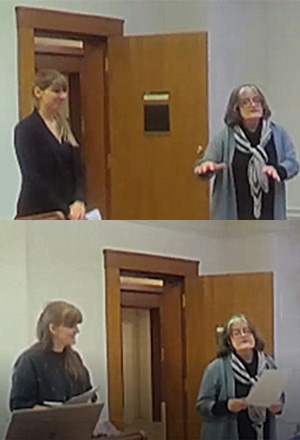
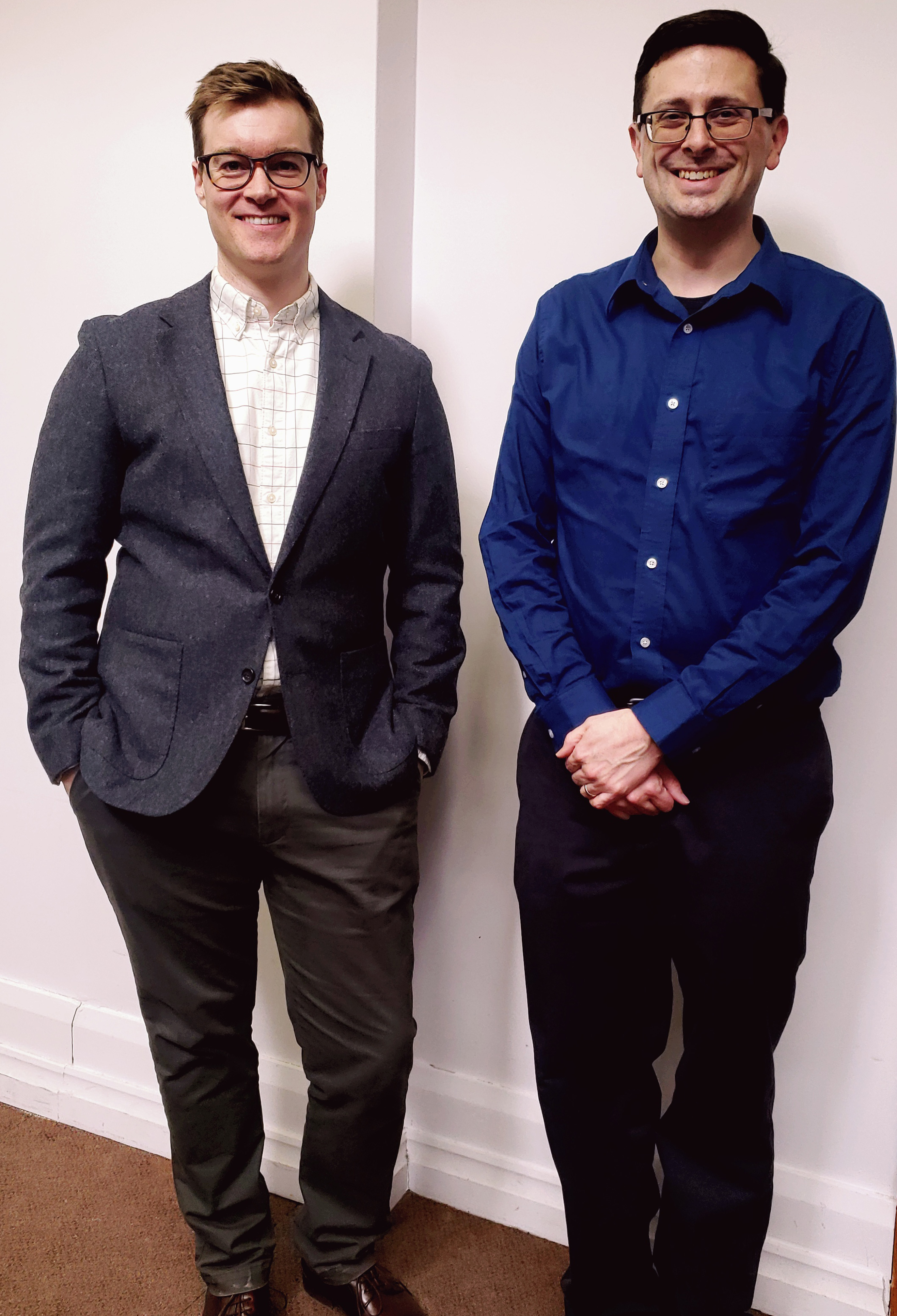
University of Toronto members are invited to register to participate in the 2023-2024 Convivium season! Please visit the online Conivivum form to provide your availability, propose a title, or nominate a participant.
External Events
April 13-21 - ISCAD5 Exhibition: How Does it Feel?
April 14-15 - Very Gluttonous Very Raunchy Very Late Medieval: A Staged Reading of 6 New Play Translations from Middle French and 15c Spanish
April 24 - IAMCC Distinguished Lecture: What problems does the Great Mongol Shahnama pose?
May 18-20 - Conference: The Other Sister: New Research on Non-Cloistered Religious Women (1100-1800)
September 21-23 - CRRS Conference: Worlds of Conflict: Violence in the Early Modern Period
Acclamations
Faculty News
Professor Alexandra Bolintineanu was awarded the 2023 CARA Teaching Prize from the Medieval Academy of America.
Professor Elisa Brilli along with Etienne Anheim (EHESS, Paris) was awarded the CNRS/U of T Joint Call for PhD Mobility Funding, supporting the mobility expenses of two doctoral students working on “The Autonomization of Intellectuals in the Late Middle Ages”.
Professor Shami Ghosh was awarded the Chancellor Jackman 6-month Faculty Research Fellowship in the Humanities for 2023-2024.
Under the supervision of John Magee, Tommaso De Robertis was awarded a 3-year MSCA Postdoctoral Fellowship with a project on “Re-orienting the Foundations of ‘New Science’: John Philoponus and the Modern Theories of Space and Void (1520-1604)”.
Professor Sebastian Sobecki was elected as Fellow of the Prestigious English Association.
Student News
Samuel Cardwell successfully defended their dissertation, “The Idea of Evangelisation in Latin Christianity from the Early Church to Bede”
Alumni News
Dyan Elliott’s The Corrupter of Boys: Sodomy, Scandal, and the Medieval Clergy (Philadelphia: University of Pennsylvania Press, 2020) was awarded the 2023 Haskins Medal Award. (PhD 1989)
Winston Black was named a 2023 Michael E. DeBakey Fellow in the History of Medicine. (PhD 2007)
Walker Horsfall accepted a new position as Assistant Professor at the University of Illinois Urbana-Champaign. (PhD 2022)
Alumni Programme
We welcome CMS Alumni to stay connected and contribute to CMS projects on a wider spectrum. With opportunities to participate in professional development, mentorship, and lectures, we invite you to fill out the Alumni Programme form.
Since 1968, the Centre for Medieval Studies has counted hundreds of alumni who continuously nourish its reputation. There are a variety of ways in which Alumni, working both in and outside of academia, can actively contribute to the life of the Centre.
MST 1003 Guest Speaker: This course prepares students working in the field of Medieval Studies for dissertation work and the future job market, providing an overview of non-scholarly skills. Interested Alumni may be invited as Guest Speakers depending on their availabilities and course requirements
CMS Alumni Mentorship Programme Ambassadors: Matched based on interests and fields of expertise, CMS Ambassadors make themselves available to provide individual mentorship to advanced PhD students, helping them navigate the delicate transition from doctoral research to the job market.
CMS Convivium: This lecture series fosters scholarly exchanges and provides a space to showcase our community. Alumni may be invited to present their in-progress and collective research.
CMS Alumni Dissertation Award Committee: Each year, this Committee is invited to identify the best PhD dissertation defended at CMS during the previous academic year. Any alumni currently working in academia with a CMS PhD may register to serve.
Donors: Gifts to the Centre support our work in a way no other contribution can. We are proud of the achievements of our faculty and our students, and we are extremely gratified by the faith in our programmes shown by generous friends and alumni. Donations can be made online through the University of Toronto, and are tax-deductible.
Please register for the 2023-2024 Alumni Programme at: uoft.me/978
and contact medieval.communications@utoronto.ca with any questions.
For additional information, please visit Alumni Support online.
Important Dates and Information for CMS Students
Social
Don't forget the April 18th potluck to be held in the Great Hall beginning at 11:30 am!
Wellness Committee
It’s that time of year again when CMS enters into the end-of-semester crunch time coupled with the end-of-year language exams. It can be challenging to balance all of these April responsibilities, so it is as important as ever to prioritise your health. Even when you feel like you don’t have that extra time for sleep, remember that eating and sleeping well, and making time for physical activity and breaks, are all things that reduce your stress and promote your productivity and schoolwork. Remember to use all of your support systems – your peers, family, friends, learning strategists, counselors, etc.
If you are struggling, always feel free to reach out to the Wellness Committee for support. Keep in mind that MySSP is available to students 24/7 in your mother tongue. Practice the IAR (Identify, Assist, Refer) model, particularly with the students you are teaching. In sum: look out for yourself, your buddies, and your students as the year comes to a close.
Best wishes for a healthy and successful end to the year, as well as a restful and enjoyable summer!
Wellness Committee
Brianna Daigneault brianna.daigneault@mail.utoronto.ca
SGS
Please visit the SGS website for more important Winter 2023 session dates including deadlines and convocation information.


